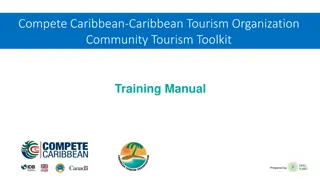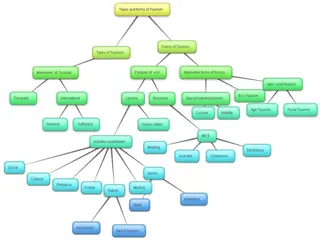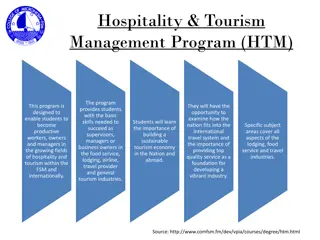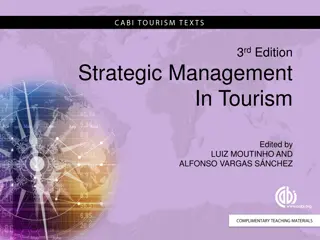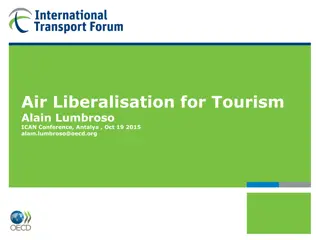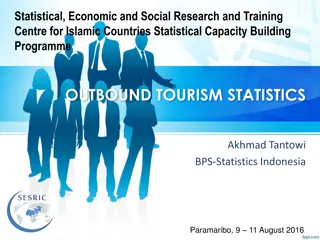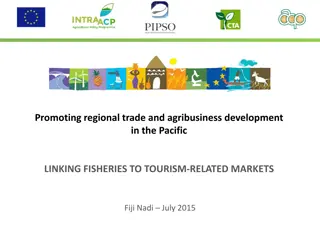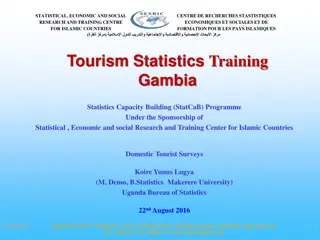Management Strategies for Crisis in Tourism Industry
Explore the crucial role of crisis management in the tourism sector, understanding how internal and external shocks impact the industry. Discover the ripple effects of crises on a global scale and delve into various approaches to studying and managing crises effectively. Gain insights into the lifecycle of crises and their strategic implications for tourism organizations.
Download Presentation

Please find below an Image/Link to download the presentation.
The content on the website is provided AS IS for your information and personal use only. It may not be sold, licensed, or shared on other websites without obtaining consent from the author.If you encounter any issues during the download, it is possible that the publisher has removed the file from their server.
You are allowed to download the files provided on this website for personal or commercial use, subject to the condition that they are used lawfully. All files are the property of their respective owners.
The content on the website is provided AS IS for your information and personal use only. It may not be sold, licensed, or shared on other websites without obtaining consent from the author.
E N D
Presentation Transcript
3rd Edition Strategic Management In Tourism Edited by LUIZ MOUTINHO AND ALFONSO VARGAS S NCHEZ
CHAPTER 16 CRISIS MANAGEMENT AND STRATEGIC IMPLICATIONS YAWEI JIANG, NOEL SCOTT AND BRENT RITCHIE
LEARNING OBJECTIVES Discuss the development of crisis management Relate crisis management and strategic management Provide areas for further research
1 CRISIS MANAGEMENT Tourism is vulnerable to internal and external shocks such as: Economic downturns Epidemic disease International conflicts
2 RIPPLE EFFECT Crisis in one region or country may trigger a global tourism crisis due to tourism s interactive links: The spread of foot and mouth disease in the UK triggered a crisis in the farming industry that impacted on the tourism industry. The war in Kosovo had negative impacts on tourism in neighbouring countries.
3 DEFINITION OF CRISIS Any action or failure to act that interferes with an organization s ongoing functions, the acceptable attainment of its objectives, its viability or survival, or that has a detrimental personal effect as perceived by the majority of its employees, clients or constituents. Faulkner (2001, p.136)
4 MAIN APPROACHES TO STUDY CRISIS 1. Life-cycle approach 2. Strategic crisis management approach 3. Action-orientation crisis management approach 4. Integrated approach
STRATEGIC MANAGEMENT AND LIFECYCLE OF CRISIS Lifecycle of crisis Stage of process Key tasks Pre-event stage allowing the development examining the macro or micro operating Strategic analysis of strategy and plans environment A stage immediately before or after a crisis developing and selecting strategic directions and or disaster occurs which requires the Strategic direction and choice specific generic strategies to achieve organisational implementation of strategies to deal with its goals impacts developing suitable organisational structures, Continued implementation of strategies to Strategy implementation and human and financial resource strategies control or reduce the severity of the control providing leadership to control and allow for the crisis/disaster implementation of specific strategies continuous improvement is an important part of A long-term recovery or resolution phase strategic planning and management allowing for evaluation and feedback into Strategic evaluation and organisations learn how to improve the future prevention and planning strategies for feedback effectiveness of strategies through evaluation, destinations and businesses monitoring and adaptive management
5 FUTURE RESEARCH 1. Organizational resilience (OR) 2. Dynamic capabilities (DC) 3. Institutional analysis and development framework (IAD)




